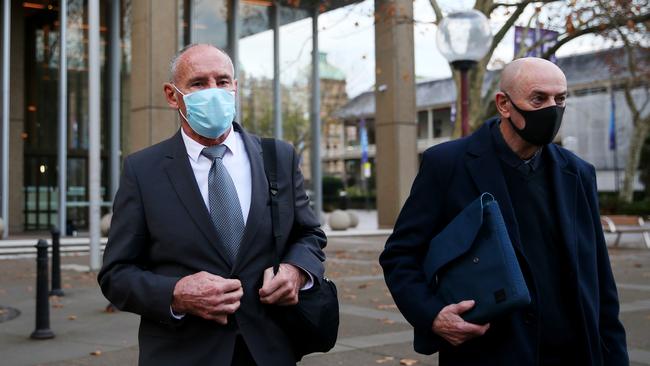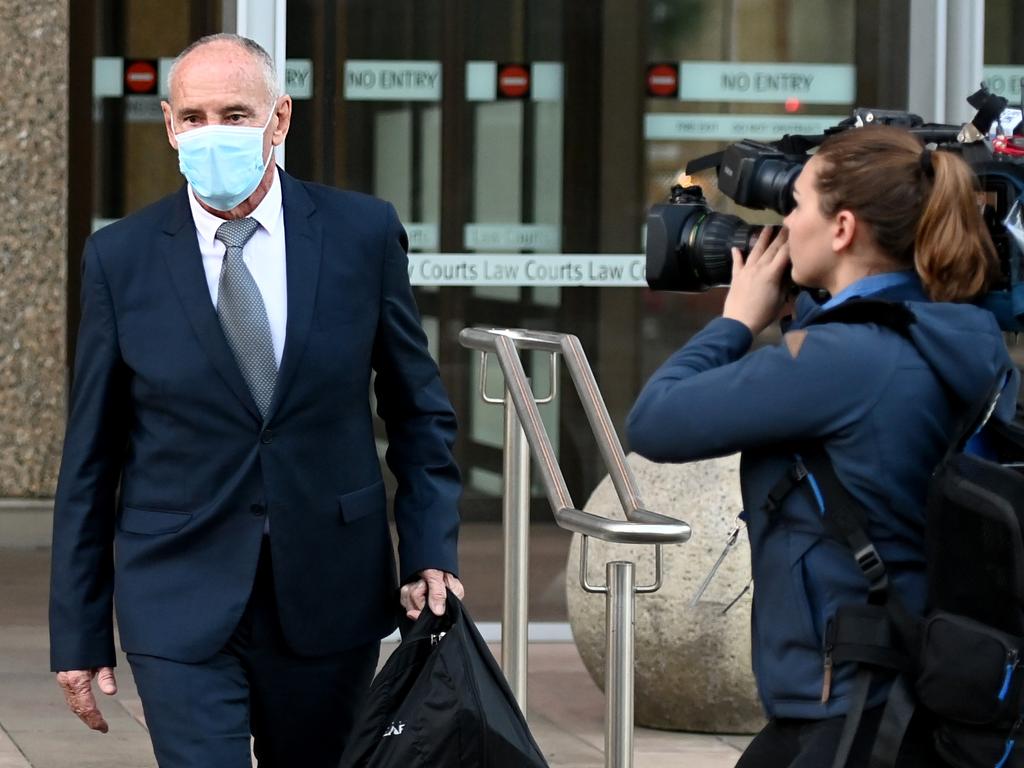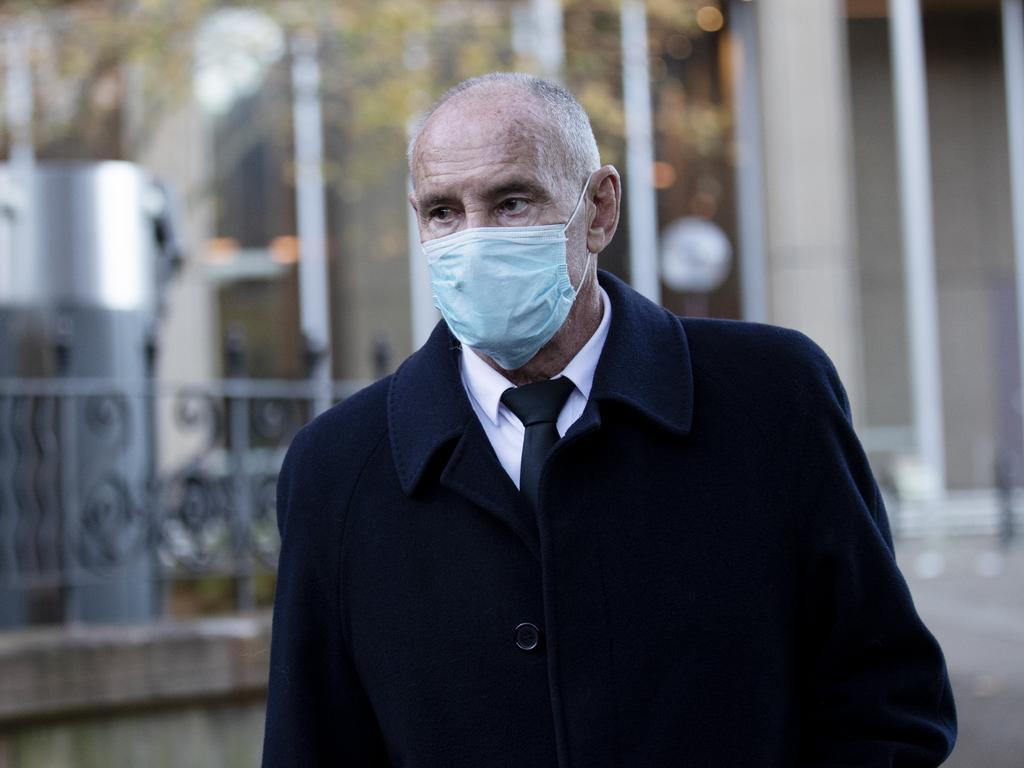Chris Dawson trial: ‘He wanted to know if I could get someone to get rid of his wife’
Newtown Jets players were on a plane when Chris Dawson allegedly made an extraordinary request of a teammate.

Newtown Jets rugby league club players were on a plane heading back to Sydney from the Gold Coast when Chris Dawson allegedly came down the aisle and made an extraordinary request of a teammate.
“I was sitting there and Chris had come along and kneeled down to my level of where I was sitting, and asked me did I know anyone that could get rid of his wife,” Robert Silkman told Mr Dawson’s murder trial on Thursday. “I was taken aback. I said, ‘What do you mean? For good?’ He said, ‘Yeah’, and I said, ‘I’ll talk to you when I get back to Sydney’. And that was the end of the conversation.”
To Mr Dawson’s legal defence team, these were the fabrications from a convicted thief and serial liar whose shady past showed he could not be trusted.
Across hours of cross-examination that followed, Mr Silkman was painted as a man not just with some admitted criminal connections, but with a dubious history of his own involving fire and alleged fraud. The defence claimed he was a man prepared to lie when it was to his advantage.
The crown case is that Mr Silkman’s shady connections were the reason he was approached by Mr Dawson in the first place, as opposed to other teammates.
At the trial, Mr Silkman certainly looked the part. He was the man in black, his head shaved, wearing thick black glasses as he gave evidence via audiovisual link from Bankstown police station.

The trial was told that back in 1975, when the chat with Mr Dawson is alleged to have occurred, Mr Silkman would knock about in pubs with Newtown’s Paul Hayward, later a convicted international drug-trafficker.
Prosecutor Craig Everson SC, with permission from trial judge Ian Harrison SC, asked him who Hayward’s brother-in-law was.
“Neddy Smith,” Mr Silkman replied, referring to the notorious standover man and murderer.
Mr Silkman said he had told the Dawson story to “plenty of people” over the years, starting with the passenger seated beside him, his friend Ray Lee.
“I said to Ray Lee, ‘You wouldn’t believe what Chris just said to me’,” Mr Silkman said. “And he said, ‘What?’ And I was laughing, and I said, ‘He wanted to know if I could get someone to get rid of his wife!’
“I think Ray’s reaction was, ‘What?!’, and I said, ‘Yeah – he’s f..king mad’.”
Mr Everson attempted to ask Mr Silkman if there was anyone in his extended circle of friends he thought “might be able to provide that service”.
Defence counsel Pauline David objected, and the question was withdrawn. The judge confirmed he would have rejected it.
Mr Everson tried again, asking if there was anyone he knew who could do what Mr Dawson had been asking. There was further legal debate and the proceedings were put on mute so they could not be heard by Mr Silkman.
When Mr Silkman resumed giving evidence, Mr Everson asked him if he’d kept secret his association with Smith.
“I didn’t have no association with Neddy Smith – only a hello in a hotel,” Mr Silkman said.
He added that his friendship was with Hayward, Smith’s brother-in-law.
The flight at the centre of Mr Silkman’s highly contested evidence had followed an end-of-season trip to the Gold Coast by the Newtown footballers.
Players stayed at the Tiki Village resort at the river end of Cavill Avenue, Mr Silkman said.
While they were there, they went to a beer garden to watch Muhammad Ali fight Joe Frazier in the “Thrilla in Manila”.
The fight was on October 1, 1975, placing the events firmly in time. Mr Dawson’s wife Lynette vanished just over six years later, in January 1982.
Ms David for the defence produced extracts of Newtown rugby league club annual reports.
They stated team members stayed in Coolangatta, not in Surfers Paradise as stated by Mr Silkman. It further undermined his credibility, she suggested.
“They’ve made a mistake,” Mr Silkman said. “We flew into Coolangatta then we (were) transported to Surfers Paradise.”
Mr Everson said that like a lot of things in the case, these records were a “double-edged sword”.
Ms David suggested to Mr Silkman that his story was a “total fabrication”, and that Mr Dawson was never even on the plane.
She then ran through Mr Silkman’s “aliases”, including “Robert Charles Hoods”.
Mr Silkman said it was a name he used as a teenager. He denied the suggestion from Ms David that he had also used a different spelling, calling himself Robert Charles Silkmen.
But he did agree that he had used the name John Kenneth Goodman.
He said that wasn’t an alias – he had once legally changed his name to Goodman because he “didn’t like” his birth name.
Mr Silkman’s criminal history included a 1995 conviction for burning down a building. He told the court this was to menace a friend who wouldn’t repay a debt, not for insurance fraud as suggested by Ms David.
It was all building to a suggestion that his allegations were financially motivated.
Near the end of the cross-examination, Ms David put it to Mr Silkman that when he spoke to police for the first time in November 2018, he was going for the $200,000 reward for information on the case.
Mr Silkman said he didn’t know there was a reward – but that if there was one, it could be donated to help stop violence against women.
As a father of daughters, Mr Silkman said, he had no time for an adult who wanted to “groom” teenagers.
He was referring to allegations Mr Dawson and other teachers preyed upon their students at northern beaches schools in the 1970s and 80s.
“But saying that, I wouldn’t lie about it to have him punished,” he added.
Ms David put it to Mr Silkman that he had decided to help the police with false evidence.
“Incorrect,” Mr Silkman told her in response.






